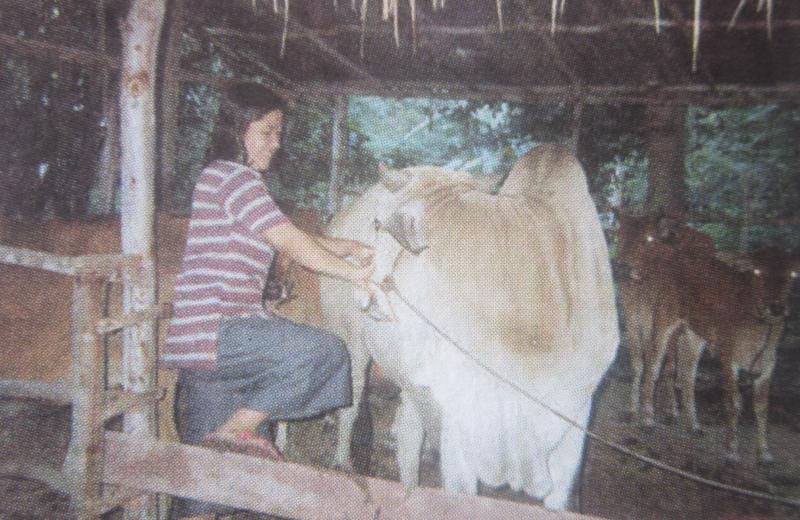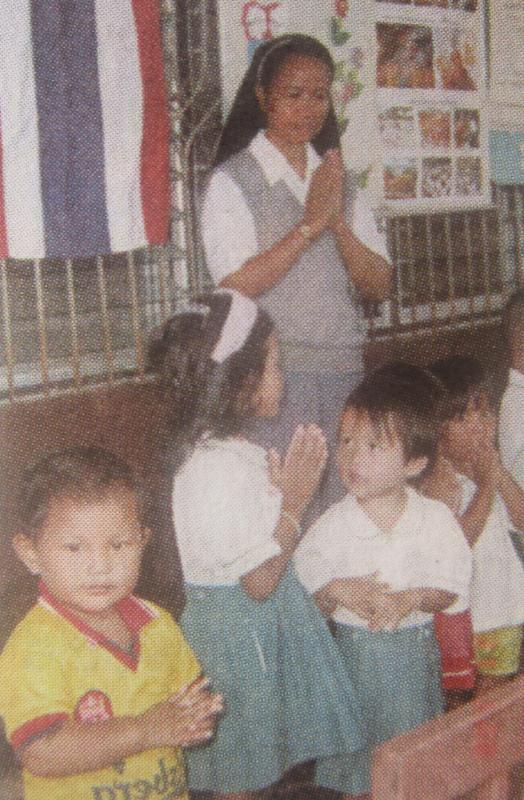Following St. Francis
By Gee-Gee O. Torres
The village of Nong Din Dam in Thailand may seem very far away from the village of Assisi in Northern Italy but they are connected. A thousand years ago in Northern Italy, St. Francis burst upon the world to remind the Church that we must become a Church of service and a Church of the poor. Since then, thousands of people have followed in the feet of St. Francis and among them are the four Filipino Franciscan sister of the Immaculate Conception who have settled in the village of Nong Din Dam. I went to visit the sisters on my trip to Thailand. I enjoyed seeing the little ways and the projects which they have used as instruments of service for the poor and their way of following the Gospel. Let me introduce you to these four women.
Maka-Tao
 Sr. Lita has been on mission in Thailand for 14 years now. She considers her work ‘maka tao’. She runs a day care center where parents in the village leave their children before they go to work. St. Lita with the help of an assistant takes care of them. She integrates value formation and the spirit of sharing in their various activities. The children bring rice and the sisters prepare a nutrition meal for them. After lunch the children take a nap. Then they are given a bath before their parents collect them in the afternoon. Parents pay a small amount, but those who cannot afford the tuition fee give gifts like vegetable and fruits.
Sr. Lita has been on mission in Thailand for 14 years now. She considers her work ‘maka tao’. She runs a day care center where parents in the village leave their children before they go to work. St. Lita with the help of an assistant takes care of them. She integrates value formation and the spirit of sharing in their various activities. The children bring rice and the sisters prepare a nutrition meal for them. After lunch the children take a nap. Then they are given a bath before their parents collect them in the afternoon. Parents pay a small amount, but those who cannot afford the tuition fee give gifts like vegetable and fruits.
The mothers are also taught the proper way of taking care of their children and the right kind of food to give them. They have sewing classes, too. They make bags and nightwear which they sell to earn extra money.
I asked Sr. Lita how her vocation began. She answered, “It all started in high school when I first saw missionaries in my hometown in Zambales. Our school directors then were Columban Fathers Vincent O’Brien and Peter Kenny. After college I went back to teach in the same high school where I graduated and they were still there. My father was also an active lay minister in the parish run by the Columban Fathers vocation is not accidental. It wasn’t by chance that I was in that school.
Maka-Hayop
 Sr. Luchi from Neuva Ecija graduated with a Bachelor degree in Animal Husbandry. When she joined the SFIC, she taught she would never practice her course. She thought sisters just pray all day and all night. However when she was sent on mission to Thailand, she was assigned in the animal care and production project. Now she is a full-time veterinarian, in short ‘maka-hayop’.
Sr. Luchi from Neuva Ecija graduated with a Bachelor degree in Animal Husbandry. When she joined the SFIC, she taught she would never practice her course. She thought sisters just pray all day and all night. However when she was sent on mission to Thailand, she was assigned in the animal care and production project. Now she is a full-time veterinarian, in short ‘maka-hayop’.
She started a livestock project with just 4 hens and a borrowed rooster from their parish priest, a cow and a calf, and two pigs. But today the animals have grown in numbers. Sr. Luchi distributed them to the villagers. The villagers raise the animals and give some of the offsprings to Sr. Luchi as part of their agreement.
“Animal care is physically tiring,” says Sr. Luchi. “I have to gather gabi, banana shoots and other herbs from the forest for the pigs, bring the cows to the grazing field and feed the chickens. But it’s fun, too. When our Superior came to visit us, we told her how. One day while we were dragging our cow to the village, the villager asked us, “Sister, where are you taking the cow?” (We wished they hadn’t asked.) We told them, “We’re looking for a mate, a bull.
Sr. Luchi finds the song Ang Panginoon ang aking Pastol meaningful as he pursues her mission assignment. Madilim na lambak man ay tatahakin ko, wala akong sindak siya’y kasama ko. Ang hawak niyang tungkod ay siyang gabay ko. Tangan niyang pamalo sigla’t tangulan ko.
Maka-Lupa

She initiated farming projects with the villagers. They planted rice. They where able to harvest 10 sacks of rice in the first year; but after that, production declined due to many factors like lack of fertilizer and water supply. Because of this the project was discontinued.
Sr. Carmen was given another assignment: to manage the newly–opened St. Francis Day Care Center. She enjoys teaching the pupils – basic English, value formation, Thai culture.
My work as a teacher has taught me the virtue of patience. First I have to learn the very complex Thai language. Secondly the children in school are restless. I always have to be on guard not to lose my patience. My personal commitment to Christ and His mission however keeps me going,” says Sr. Carmen.
Maka-Pera

In 1983 she was sent to Thailand with Sr. Carmen. She studied the Thai language during the first year. The following year she began with her mission: to teach the villagers the value of saving. She taught of putting up a cooperative. But the parish priest discouraged her because the cooperative there failed before. Sr. Beth was determined to pursue her project. She looked for a group with fixed income. She approach Sr. Lita’s group of mothers if they were interested in her project. They were and so began the coop.
For the few years it was successful. It helped them in their financial needs. But problems arose. The number of the members attending the meetings decreased. And when Sr. Beth suggested to increase their monthly contribution, their enthusiasm waned significantly. So the cooperative stagnated. But this year they want it revived.
“Life is never a sacrifice if it is lived out of love. And I love to live here. It feels great to be with the people – cultivating values, fostering family spirit and building communities,” tells Sr. Beth.
It would be beautiful to have all our projects succeed but, after all these projects are only vehicles for sharing the love of God and our Filipino Sisters have certainly succeeded in this.

